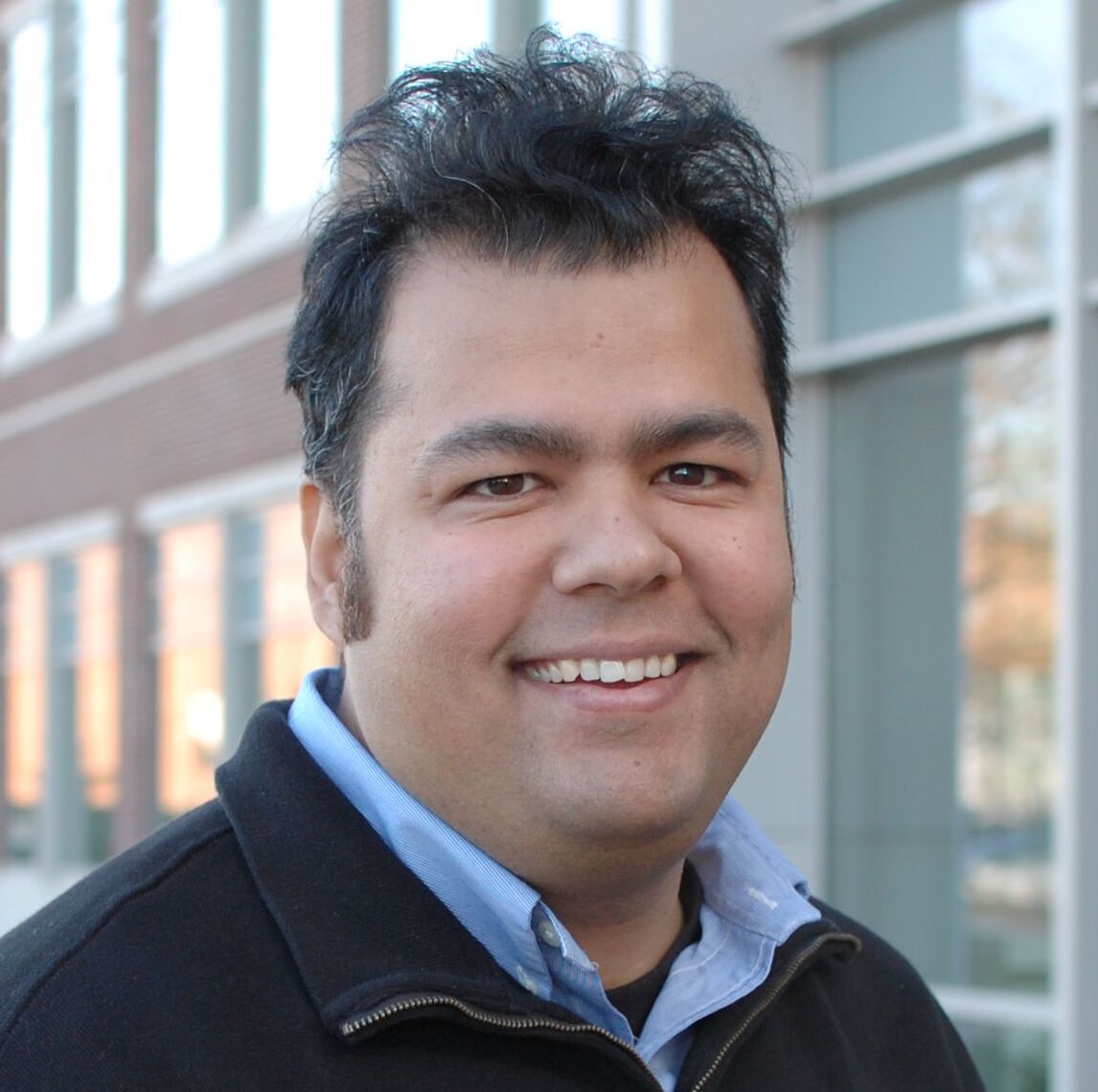
Gaurav Chopra

Assistant Professor
Department of Chemistry
Purdue Center for Drug Discovery
Email: gchopra@purdue.edu
Phone:765-496-6108
Office: DRUG 261
Lab webpage: http://www.chopralab.com/
Chemical Biology
Cancer Biology
Microbiology, Immunology and Infectious Diseases
Computational and Systems Biology
Integrative Neuroscience
Active Mentor - currently hosting PULSe students for laboratory rotations and recruiting PULSe students into the laboratory; serves on preliminary exam committees
Current Research Interests:
The theme of my laboratory is Chemical Immunology. We are interested in understanding and chemically perturbing immune microenvironments in disease (cancer and neurodegeneration). We use immunological, synthetic, and proteome-scale methods to discover, design, synthesize and verify immunomodulatory chemical entities that are specific to immune cell subtypes (e.g. MDSCs, microglia, astrocytes, etc). We have developed a novel interactome based drug discovery and design platform that analyze compound-proteome interaction signatures at the genomic (proteomic) scale to determine drug behavior, in contrast to traditional single target approaches. We use machine learning to develop ‘computational assays’ to complement and guide chemical synthesis and biological experiments done in our laboratory and identify targets/networks to design drugs/combinations for specific cellular phenotype ex vivo and in vivo. My group and our collaborators have used this approach to identify putative drug leads (new synthetic leads, combination of existing drugs) using in vitro and in vivo preclinical studies for more than 10 different diseases including cancer, immunological, metabolic, infectious and genetic indications (castration resistant prostate, invasive bladder cancer, Alzheimer’s disease, type 1 diabetes, dental caries, dengue, herpes, drug resistant tuberculosis, etc). The two research themes of my lab in “data-driven chemical methodology” and “cell-specific chemical immunomodulation” will help us achieve our goal to develop immunomodulators (small molecules, cell conjugates, etc) that may be used therapeutically, as well as, “probes” to perturb immune microenvironments to explore cell-responsive pathways in different diseases.
Students in our lab choose their research track based on their interest (see http://www.chopralab.com). We enjoy working with passionate individuals who care deeply about their research ranging from computational chemistry/biology to chemical biology wet-lab bench / animal work or both. Our lab culture is very open and encourages creativity and persistence to solve problems. Students in our lab will have the opportunity to identify problems they are most interested in solving. Our goal is to train students into well-rounded scientists so that they can develop an expertise in the lab. In summary, we are looking for smart, talented and passionate individuals so that we can learn from them as much as they learn from us.
Selected Publications:
†denotes corresponding author *denotes co-first author
Chopra G, Summa CM & Levitt M. Solvent dramatically affects protein structure refinement. Proc. Natl. Acad. Sci. U.S.A., 105(51): 20239-20244 (2008). (Structure)
Chopra G†*, Kalisman N* & Levitt M. Consistent refinement of submitted models at CASP using a knowledge-based potential. Proteins, 78(12): 2668-2678 (2010). (Structure)
Chopra G† and Levitt M. Remarkable patterns of surface water ordering around polarized buckminsterfullerene. Proc. Natl. Acad. Sci. U.S.A., 108(35):14455-14460 (2011). (Interaction: Chemistry)
Rodrigues J, Levitt M and Chopra G†. KOBAMIN – KnOwledge BAsed MINimization server for protein structure refinement. Nucleic Acid Research, Web Server Issue. 40 (W1): W323-W328 (2012). (Infrastructure)
Horst JA, Pieper U, Sali A, Zhan L, Chopra G, Samudrala R & Featherstone JDB. Strategic protein target analysis for developing drugs to stop dental caries. Adv. Dent. Res., 24(2): 86-93 (2012). (Application: Dental Caries)
Lertkiatmongkol P, Assawamakin A, White G, Chopra G, Rongnoparut P, Samudrala R, Tongsima S. Distal effect of amino acid substitutions in CYP2C9 polymorphic variants causes differences in interatomic interactions against (S)-warfarin. PLoS One. 8(9): e74053 (2013). (Function, Interaction)
Minie ME*, Chopra G*, Sethi G, Horst JA, Roy A, White G, Samudrala R. CANDO and the infinite drug discovery frontier. Drug Discovery Today. 19(9):1353-63 (2014). (Systems, Interaction)
Ali ZA, de Jesus Perez V, Yuan K, Orcholski M, Pan S, Qi W, Chopra G, Adams C, Kojima Y, Leeper NJ, Qu X, Zaleta-Rivera K, Kato K, Yamada Y, Oguri M, Kuchinsky A, Channon K, Charest A, Quertermous T, Ashley EA. Oxido-reductive regulation of human vascular remodeling by the orphan receptor tyrosine kinase ROS1. J. Clinical Investigation. 124(12): 5159-74 (2014). (2014). (Application: Cardiovascular)
DuPage M, Chopra G, Quiros J, Rosenthal WL, Morar MM, Holohan D, Zhang R, Turka L, Marson A, Bluestone JA. The chromatin-modifying enzyme Ezh2 is critical for the maintenance of regulatory T-cell identity. Immunity 42(2): 227-38 (2015). (Application: Immunology)
Sethi G*, Chopra G*, Samudrala R. Multiscale modeling of relationships between protein classes and drug behavior across all diseases using the CANDO platform. Mini Reviews in Medicinal Chemistry 15(8): 705-17 (2015). (Systems, Interaction)
Fuhrman CA, Yeh W-I, Seay HR, Lakshmi PS, Chopra G, Zhang L, Perry DJ, McClymont SA, Yadav M, Lopez MC, Baker HV, Zhang Y, Li Y, Whitley M, von Schack D, Atkinson MA, Bluestone JA, Brusko TM. Divergent phenotypes of human regulatory T cells expressing the receptors TIGIT and CD226. J Immunology 1402381 (2015); doi: 10.4049/jimmunol.1402381 (Application: Immunology)
- Faculty Profile

